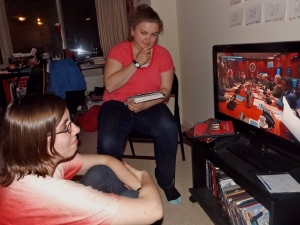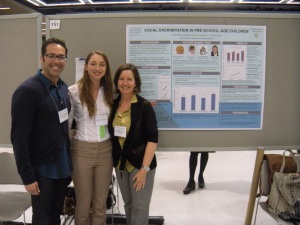
The following post was written by UHP student and SURE Award winner Michelle Stuhlmacher.
Late in April hoards of geographers will descend on Chicago, Illinois to share their research, attend plenary sessions, and generally revel in the wonders of geography. The annual meeting is hosted by the American Association of Geographers (AAG) and, thanks to money from the SURE award, this year I will be joining them!
I will be presenting research that I conducted as part of the Hollings Scholarship Program with the National Oceanic and Atmospheric Administration (NOAA). This summer I worked at the National Centers for Environmental Information (one of the NOAA branch offices) in Asheville, NC. My mentor had created an index for snowfall that is like the Enhanced Fujita Scale for tornado or the Saffir-Simpson Hurricane Wind Scale. The scale is called the Regional Snowfall Index and my job for the summer was updating the way it incorporated census data.
To do this I used ArcGIS and programmed scripts in Python. I learned so much over the summer and did some extra analysis on the new Regional Snowfall Index calculations. This analysis, and what it says about our society’s vulnerability to future snowstorms, is what I will be presenting at AAG.

Category: Research Stories
Elliott School Undergraduate Scholars Program
The following blog post was written by Jenny Hamilton, a senior in the Elliott School of International Affairs and an Elliott Undergraduate Scholar.
Would you like the opportunity to spend winter break in Haiti or Bosnia? Do you want to probe the minds of top US diplomats on the potential for an embassy in Iran? Would you jump at the chance to present original research at a conference in Chicago or on Capitol Hill?
If you answered yes to any of these questions (and are going to be an Elliott junior or senior spending all of next year here in Foggy Bottom), you might be a good candidate for the Elliott Undergraduate Scholars Program.
The Elliott Undergraduate Scholars Program provides extensive support to a small cohort of students pursuing independent, original research every year. Through the program, you will have the opportunity to:
- Work with a faculty adviser and graduate student mentor.
- Receive a $500 research stipend with the opportunity to apply for additional funding
- Learn about research methodology and the writing process from top GW faculty
- Provide and receive intensive peer review of paper drafts
- Present and publish your research through the Elliott School
Participating in the Elliott Undergraduate Scholars Program was one of the best decisions I made during my four years at GW. Through the program, I am studying the impact of popular definitions of democracy on democratic legitimacy using African public survey data – in plain terms, I’m investigating whether citizens’ varying conceptions of democracy affects whether or not they believe it is the best form of government. If democratic consolidation isn’t your cup of tea, that’s okay. This year, scholars are studying topics from Liberian land reform to Chinese cybersecurity threats, from Argentinian waste management to Russian immigration policy. Every week, I learn from them as they unveil amazing discoveries and make substantial contributions to their field of international affairs.
If you are considering the Elliott Undergraduate Scholars Program, a few things to keep in mind:
- Although it counts for your honors thesis, this program is NOT your typical senior thesis. It is a substantial time commitment, so with that being said…
- Make sure to choose a topic you love! If you are passionate about your topic, your year will be amazing. If you are not, it will be miserable.
- Put time into your proposal! If you do not have considerable previous experience with the topic, you will need to take time to do research.
- Make sure you find a faculty advisor with whom you can work well.
The application is due April 13 and has several components, so make sure to start it soon! You can find more information about the application process and the program on the Elliott website here. If you have any questions, feel free to email me at jham93@gwmail.gwu.edu. Best of luck!
Derek Lee: Presenting and Publishing on Authenticity [Research Stories]

The following post is written by Honors Program student and UHP SURE Award winner Derek Lee.
My SURE award culminated in the presentation of an original paper, “Authenticity and its Application as a Moral Ideal”, at the San Diego State University Undergraduate Philosophy Conference. The piece first started in Professor Ralkowski’s Arts and Humanities class on Existentialism. After writing the final paper for the class, I wanted to look further into how philosophy melded the unique concepts in Existentialism with the concepts in Ethics—the major focus of my studies. Under Professor Ralkowski’s guidance, I delved into the current dialogue between philosophers on the subject. I gathered a greater appreciation of what the major arguments were, and made my own arguments stronger. At the end of the summer, I submitted my paper to the conference, and was accepted to present. I had the further honor to be published in the upcoming special edition of the Dialogue, the conference’s journal.
The conference itself was probably the best part of the SURE experience. I had the opportunity to present my paper to both undergraduates and professors, who gave me valuable feedback and furthered the arguments made in the paper. I also had the opportunity to see other undergraduates and Masters students present their original works, taking part in the same process they assisted me in. The pieces involved were on a variety of topics, and I learned a lot from being exposed to so many ideas in the three day time span. I was even exposed to a theory I had little work in—just war theory—which will be the subject of my senior thesis. Without the funding from the SURE award, I would never have been able to afford attending the conference, and would have gained far less from the research project.
Sustainable Gardening in Brazil [Research Stories]
This post is written by Honors student and UHP SURE Award winner Haley Burns.

I used the SURE Award to help fund my research on sustainable agriculture feasibility while in Brazil.
As part of my research, I lived in a tent on a property where a man is attempting to build a house using only the resources he has on the property. His goal is to have a self-sustaining garden, with a permaculture design – meaning the garden beds are made from places that are already there so that the landscape is not changed too much. I helped create a couple of the garden beds, separate seeds from dried plants, start and water seedlings, and plant pumpkin plants.

The land is situated close to the park Chapada Diamantina, in my opinion, one of the most beautiful places on earth. The views every day were stunning! Because of the heat, we only worked in the mornings. There were no showers or electricity, so we bathed in the nearby river, and had only one lightbulb from a single, tiny solar panel.
In conclusion, the work on sustainable projects, even this tiny, is incredibly difficult and energy draining. To bring this to largescale agriculture on such and extreme level of sustainability would be nearly impossible. The takeaway, though, is that we could apply some of the methods on a large scale without being extreme. Compost, permaculture, and seed collection could all be implemented in larger conventional farms to make the system a little better for the world.

Research Days: Your Turn in the Spotlight
UHPers, we know you’re busy bees with research. Between exciting classes, your senior thesis work, and the results of SURE funding, we know a bunch of you are out there right now doing exciting research.
But don’t keep your excellence all to yourself. Share it with the world!
You have until February 23rd to submit abstracts to GW Research Days 2014. It’s a great opportunity to present on the great work you’re doing!
Don’t dilly-dally, you need to represent the UHP! Submit your abstract to GW Research Days 2014 by February 23rd, 2014!
The Seizure Detection Device [SURE Stories]

The following post is written by UHP student and SURE Award winner Pavan Jagannathan.
The money from the SURE Award will be used to help build my capstone design project. What my group and I are attempting to build is a device that can identify seizures before they happen. This “Seizure Detection Device” is a collection of systems responsible for interpreting a tonic-clonic EEG seizure signal, reporting it to the user, and calling first responders at the discretion of the user. The system utilizes an electrode “helmet” that transmits the EEG signals via Bluetooth®™ to an Android™ smartphone. The application on the Android™ analyzes, compares the signals to tonic -clonic seizure signals, and relays the appropriate response to the user on the graphical interface of the application. Continue reading “The Seizure Detection Device [SURE Stories]”
Television, Pizza, and Political Beliefs [SURE Stories]

This post is written by UHP student and SURE Award winner Kara Dunford.
Television viewers across the country need little more than a remote to explore life inside our nation’s political arena, as writers for series such as The West Wing, Veep, and most recently, House of Cards present their own imagined political realities via scripted programming. Continue reading “Television, Pizza, and Political Beliefs [SURE Stories]”
Coo-KIES, Conferences, and the SURE Award [SURE Stories]

Seattle – home of notable Starbucks, Nordstrom, and the awe-inspiring Costco – is also the home of my research début at the 2013 SRCD Biennial Meeting. The UHP/SURE award partially funded my travel expenses for this three-day conference with professionals in the field of child development research. With the help of two of my professors in the Speech and Hearing Science Department, Dr. Francys Subiaul and Dr. Cynthia Core, I submitted my Independent Study research as a poster presentation for the conference and was fortunate enough to be selected. Continue reading “Coo-KIES, Conferences, and the SURE Award [SURE Stories]”
Writing Hollywood [SURE Stories]

The following post is written by UHP student Jacob Garber, who received a UHP SURE award for research in Spring 2013. —
Hollywood TV is created behind the closed doors of the writers’ room. The writing staff brings life to comedies and dramas alike, yet the operation of these writers is largely unexplored. I am assisting Professor Phalen conduct an in-depth study of Hollywood writers, venturing into the writers’ room, exploring the relationship between the writer and the program, and tracing the history of TV writing from its roots in radio and stage performances. We hope to provide a holistic view of TV writers, from professional microculture to their larger role in the Hollywood system. Continue reading “Writing Hollywood [SURE Stories]”
Herbert is a senior in the UHP, who was recently published. The following post is written by him about what he did to get published:
I was selected to be a participant in the 2011 Summer Undergraduate Research Fellowship Program with the Department of Molecular Medicine at the University of Texas Health Science Center. I researched in the lab of Dr. P. Renee Yew. Specifically, we studied cyclin-dependent kinases (CDKs) and their inhibitors, both critical in the regulation of the cell cycle. We identified sites of phosphorylation on a particular CDK inhibitor (Xic2) found in the frog model Xenopus laevis. Phosphorylation at these sites serves to inhibit Xic2 degradation during interphase. We also elucidated a mechanism to show how Xic2 turnover occurs when DNA is first being replicated. Xic2 shares sequence homology with p21, a critical mammalian cell cycle regulator notably in response to DNA damage.
The paper was just published today on the website of Cell Division:
http://www.celldiv.com/content/8/1/5/abstract
